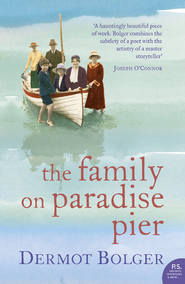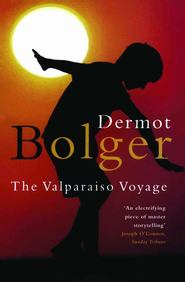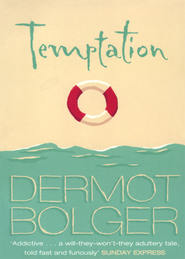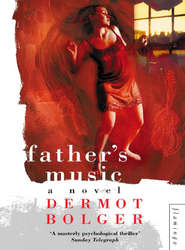По всем вопросам обращайтесь на: info@litportal.ru
(©) 2003-2024.
✖
The Woman’s Daughter
Настройки чтения
Размер шрифта
Высота строк
Поля
I walked past them into the hall and climbed the bare stairs to the top step. This is my step, I thought, this is my house. I said it over and over again as if I couldn’t believe that other floors weren’t built on top of it and people would not keep tramping up and down to them. And as I sat up there on that floorboard in the darkness, gazing down with a strange sense of pride at the bare circle of light in the hall, it seemed as if a child’s bony fingers reached out to pinch my back from the empty landing behind me. I never turned my head, I sat perfectly still, watching the backs of the two men as they bent beneath their loads, and listening to the echo of their boots retreating down the concrete path.
Every morning the same; the monotonous meals prepared and carried upstairs, the silence when they sat, the manic cheerfulness of the woman’s voice as she unveiled the small tokens of gossip and snatches of conversation she spends her day inventing to carry home like worms in her beak. And then the irretrievable silence settling like dust in the room when the train of lies slows to a halt and there is nothing left to make of the day. Then sometimes, like now, the story will begin, narrated over and over, part by part, as if some key that had been mislaid in all the other tellings might suddenly glint in the light of this one. Again and again the faces, the actions, the voices of this house, as if the recounting could somehow exorcize them. Always she begins it for the girl whose mute eyes show no recognition. Always she finishes it for herself as if only the chain of memories sustained her.
The sitting-room was always cold, no matter if you lit a fire. You could put a glass of ice beside the heater and it wouldn’t melt. At first Johnny would never go upstairs by himself. I’d find him alone in the hall and he’d take my hand even though I was smaller. We’d ascend, step by step, always expecting to find white eyes staring at us through the banisters. And then we’d stand at the top feeling foolish, confronted only by three white doors. At night we often heard the sitting-room door slam, even after Daddy had carefully locked it.
The priest came at dusk in a long black cloak and my arms ached from helping Mammy to scrub the lino clean. We knelt in a circle with beads in our hands while he blessed the house in Latin. He took out a framed picture of the Pope and wrote our details in the slots below it, and we hung it across the room from the Sacred Heart lamp. The sitting-room door never banged any more. It was always kept locked and only used for visitors. Even now, I’m frightened before I open that door, as if Mammy and Daddy are still kneeling there, the beads in their hands criss-crossed by cobwebs.
This is the spot where the archers’ horses paused first by the stream. They shook their manes that were caked with mud and lowered their noses towards the water. The King rode past with his lieutenants and stopped to examine the ancient trees which the saint had planted there. Sunlight quivered through the thick foliage and sparkled upon the axes the foreigners carried by their sides. Here where two streams met, a mile from the village, they made their camp in the woods. The axes bit into the trunks, the sap ran over the blade. They fell with a loud crackling of limbs. The beech trees and the yew were sliced and shaped into arrows, the ash was bent into long bows. Campfires flickered through the dense forest where peasants watched from the shelter of bushes. Scouts rode back and forth from the walls of the Pale, rabbits bolted into burrows between the roots of trees.
An archer shivers and cries in his sleep, the friends who bury him catch his inheritance. Plague runs swiftly through the ranks, delirious strangers shiver among brambles and day lilies as they await death. On the hillside above the rivulet, Henry surveys the trench being dug. Clad in mail the bodies tumble down, some of them still breathing. The horsemen ride towards the coast, the peasants come out to stand in the clearing. They run the white shavings of ash and yew between their fingers. A summer breeze blows down from the north, the limbs of the sacred trees bow their heads secretively.
Below the window we could see the stream, but not set in a park like it is now. There were big tangles of bushes and old trees down there, and you could watch it disappear into the meadow that was walled in by the convent. Sometimes after dinner on Sundays, Mammy would cajole Daddy to walk with us down Washerwoman’s Hill to the Botanic Gardens. There’d be rows of black bicycles parked outside and crowds walking along the bright avenues of flowers. And the first place we’d always visit would be the huge glasshouses, all dripping wet in the steeping heat with tropical plants reaching up to the sky and water lilies in bloom on the walled pond. But I’d grow impatient and I’d tug at her hand, and drag her out past the sign beside the door forbidding perambulators.
They’d laugh at my haste as I pulled them along, through the old trees and grasses where nobody else went until I came to the wall with the convent. There we could see it again, brown now and sluggish, flowing out of that silent valley where nuns walked. Johnny and I would drop petals in it and walk along, following their progress till it came to a turn where the water banked steeply with a wild spray of foam down a waterfall and sped away. We’d race across the bridge, trying to keep up as the petals bobbed and spun in a white tide, but we could never catch them as they spun away, past the rose garden to escape down through Drumcondra. And every night when Johnny and I lay together in bed, we’d invent all sorts of plans for the future.
Do you know the one dream we always both had? What we both said we’d do when we were big enough? One morning we would set out off up the country and find where the stream first rose from the earth, and then we’d walk every step of its path, down Watery Lane and across the North Road, through the village and down the steep valley through the woods, then past our house and we’d wade into the convent grounds, through the Botanic Gardens and go on down by the parks and the factories, and on and on until we finally came to where it entered the sea. And there we’d stand together like those explorers in that film in the Casino who’d discovered the source of the Nile.
There is a legend of the dead, unboxed and unaccounted for: the story of a hunger spreading across a land. Small cabins caving in and skeletons in rags crawling through the woodland to beg alms from horsemen galloping towards the walled houses beyond Shallon. The year they stripped the carvings from the walls of the ancient reformed church, where the stench of the dead in the crypts beneath the flagstones had begun to sicken their descendants kneeling at prayer. Past the unmarked plot where the cross lay buried since Cromwell, by the gates of Dr Harty’s asylum at Farnham where twenty-two opulent incurables ranted, and through the small lane at the rear of the tavern, the chiselled marble carried in procession towards a newly consecrated home.
There are stories with nobody left to remember: of smallpox and cholera secreted in the breath of children panting from mud-hut to famished hovel, and of the headland where two streams met at the forest edge where each evening they laid them hastily, unnumbered and still warm in the open pit outside the forked railings of the cemetery.
There are legends of lights leading to nowhere, of hungers in isolated places that could waste a person. There are spikes and concrete foundations, cables twisting through the vaults beneath floorboards. There are skulls of children smiling upward.
At a quarter to nine every morning, Kitty Murphy would call for me and we would walk together to school. There was a steep bank beside the school wall and a bush that we loved to climb through. Then we’d walk primly up the steps where Sister Carmel was watching in the yard. We were in the middle one of the three classrooms lit by high, narrow windows that could only be opened by pulling long cords. There was a stove in the corner to keep us warm and two quivering tubs of ink in each desk. You’ll never know what I saved you from by never letting them get at you.
Each morning I would be hauled up and Sister Carmel would ask me my name. I’d stand in that space in front of the desks where the floorboards glistened with polish and swallow once or twice before I’d say, ‘Sandra, Sister.’ She’d grab my hand screaming, ‘What sort of a mother have you at all!’ and I’d feel the pain shoot up my arm like an electric shock. Twice the thin cane would flash and she’d shout, ‘What class of a mother gave you a pagan name?’ as my other wrist was clenched by her fingers. My hand would not open and the cane cracked against the white knuckles.
‘Your name is Brigid, after our saint. Now what is your name?’ And all I could think of was that woman waiting for me at home, of how I could hug her in the hall when I escaped from here, and I could never utter the foreign name they wanted. I’d stand silently with the palms of my hands buried under my armpits and the tears streaking down my face as I watched that old, puckered face in the habit staring down at me.
‘We’ll make you a Christian yet, no girl here will have a pagan name!’ Then the cane would dart across my bare legs as I jumped back against the wooden desk and she’d prompt the class to take up the steadily rising chant, ‘Brigid, Brigid, your name is Brigid!’ All the smug Claires and Marys and Teresas, thankful for the diversion and glad that it wasn’t them. And when I finally said, ‘Brigid, my name is Brigid,’ I knew it was a betrayal of the woman I loved.
At three o’clock the bell would ring and we’d burst out screaming through the gates. The girls would gang up, chanting ‘Frigid Brigid! Frigid Brigid!’ and follow me and Kitty Murphy to the end of our street. I’d bang on the knocker and throw my arms around her waist, crying with my face buried in her dress, and she’d hug me and cup my face in her hands, smiling as she said, ‘What’s wrong, Sandra? Were you bad at spelling? Were you bad at sums?’
But what could I say to her? How could I tell her the name she gave me was wrong? So I’d just climb into her lap and clutch her and cry until finally she would grow cross. ‘We never had any secrets before,’ she’d say, lifting me down from her lap.
I’d set the tea things out on the oilcloth on the kitchen table and my father would come in and wash up after work. They called him The Doctor there because he arrived into the factory each morning in a suit with his lunch in a leather bag and changed into his overalls in the toilets. Johnny always seemed to have a fresh cut or bruise that he’d picked up after school, fighting in the Cabra Wars. Then, still clutching a bit of bread and butter and banana in our hands, the pair of us would rush out into the street and run screeching between the lamp-posts to play Statues or Relievio or Hide-and-Seek.
I’d stand on the wall with my face pressed against the telegraph pole and count up to thirty before spinning around to scan the dark gardens with their big rucks of hedges and walls to make out the shapes of the hidden figures.
And with my skin tingling with excitement and my breath clouding with the cold I’d forget everything except those friends dodging in and out of the shadows till morning came again and Kitty Murphy knocked to accompany me on another slow journey of fear. What would they have done to you? How could they have understood? Whatever else I’ve taken from you, daughter, at least I’ve spared you that.
Climb over the gate below the row of old labourers’ cottages on the slope of the hill. Drop down on to the grass where the horse’s hooves have left their mark. See the mare snort and quiver as she watches you approach. Two girls advancing hand in hand towards the nervous animal who turns as they dart forward with sunlight minting silver from her hooves and gallops towards the laneway that runs above the dairy where the old man is watching.
In the glade below the other children call as they run down towards the sparkling water. Johnny smiles as he stands with his net, barefoot in the stream, and she is surprised by how small he looks surrounded by the gangs of boys. A fish is sighted and they stumble clumsily towards it, their feet churning up muck through which it vanishes. Midges throb in the blue air, a parent shouts from the road, an older girl lifts up her dress and splashes across an overhung pool.
Summer pours through the twisting branches, the greens and browns mirrored in the stream, and she wishes they were all gone and there was just Johnny and her climbing down across the stones in the direction of the sea. They are all her servants inside her dream world. She lies like a princess on the bank as handmaidens splash around her, and in the evening she will bathe alone in the cool water while two maids wait with the silken cloak they shall drape about her shoulders. Johnny smiles and climbs up beside her. They hold hands, with their bare feet distorted in the water.
Do you know what I hate? I cannot stand to see you lying near the edge of the bed. If you stay in the centre you cannot fall. That’s sensible, and sense costs nothing. When I was young I was taught that you always left a space beside you for your guardian angel to rest. She was with you through the day and watched over you at night. I’d sleep with Johnny curled up beside me in a ball and our angels hovered on both sides never needing to rest. We were not supposed to talk but we did, often for hours about anything. Away from the crowd he always seemed bigger with all the wisdom of those two extra years. Often to tease me he’d put his feet up against my stomach and begin to roll me over towards the edge of the bed.
‘I’ll tell on you, I’ll tell, you’ll crush my guardian angel,’ I’d whisper urgently, and he’d giggle and roll me back to him with his feet. One night when he pushed me, I just seemed to keep rolling like the bed was being pulled down towards the floor. I remember the panic, with his hands trying to grab me and then falling into the black space with no angel there.
It was daylight when I woke in the depths of my parents’ bed and when I put my hand up to my head, it throbbed as if the bandage there had been strapped on too tight. It felt like a giant hand that was trying to crush my skull down through the mattress and I kept on screaming until my mother came. She had to lie in beside me to make me stop, just the pair of us in that double bed. And I curled up against her warmth and slept like I have never slept again, in that bed I used to crawl into after waking at night in our old flat. It was like being in the womb again, all black and safe, all loved and warm.
I was alone when I woke next and I could hear noises in the kitchens and backyards all down the row. The sound of people at tea and dogs barking across gardens so that I felt scared and forgotten, alone in the darkness. I wanted her back in there beside me, I screamed and screamed to make her come. And then I heard the creaking footsteps, one, two, three, four, the bogeyman climbing the stairs, only it was my father who opened the door to shout for me to stay quiet and not be disturbing the neighbours. I lay by myself feeling cut off, like Mrs Colgan’s retarded son up the street who was kept in the house all day and who I only saw once being chased by his mother when he escaped.
I must have slept again because it was the door opening that woke me and old Mrs Whelan, the nurse from around the corner, came into the room. On the landing I could hear my mother whispering as she sent Johnny out to the shops for biscuits. Mrs Whelan called me a brave little girl and held one hand on my shoulder as she pulled the plaster on the edge of the bandage off with one long tear. After she had bathed and rebandaged the cut and was gone, Johnny was sent up with the rest of the biscuits. He sat on the edge of the bed, apologetic and grateful that I hadn’t told on him. But I would never have betrayed him no matter what he did to me. Indeed, the more he would have done, the prouder I would have been to be able to forgive him and prove myself worthy to be his companion. I gave him two of the chocolate biscuits with a kiss and ate the rest in the darkness beneath the blankets. The next morning I woke up in my old bed still clutching the plastic wrapper.
In dreams the bed always seems to slope, the darkness waiting to claim her. Walls observe her climbing the stairs, coat-hangers sway behind stationary doors. Her father brings home a builder who tries to explain the changing temperatures in different rooms. Late one night they are awoken by her mother’s cry. Her father runs to the doctor in the next street. He drives the few hundred yards in his car to assert his social position.
She makes her First Communion in a net of white, orange candles weep heavenwards like tears defying gravity, the scrubbed knees of segregated boys gleam from the right-hand pews. She races down the steps towards the Dublin Evening Mail photographer, then watches her Saviour being crucified in the darkness of the State cinema, gently rattling the accumulated coins in her small white purse.
After school, Kitty and herself walk stiffly between the Stations of the Cross, with two lace handkerchiefs covering their heads. Kneeling at the grotto in the car-park they swap stories. The man who had raved that there was no God and ran up the aisle of the church without genuflecting, clutching a loaded revolver. And when he fired straight at the tabernacle, the bullet hit it and bounced back right through his heart.
Or the man in the house who’d renounced Christ and found that all the doors were locked. The calendar on the wall had a picture of Christ and that very date marked with a red circle. He tore it off and the next month had the same picture and date marked in red, and the next and the next. They found him dead on the floor with twelve different scenic views of Ireland lying torn from the calendar at his feet.
The wooden hatch slides shut and the mesh of light is gone. She leaves the darkness of the confession box and says her penance kneeling on the stone step of the side altar decked with candles for people’s intentions. Should Idie now, my soul would fly straight to Heaven. My guardian angel appear in silver and gold to guide me home.
I have the scar still under my hair. If I shaved my head you could see it. Somehow, life seemed different afterwards. I began to stammer when asked questions in school. The words stuck like bits of hot coal in my throat. But Johnny was always there to protect me, to shout back at the girls chanting my nickname, to watch me through the wire dividing the two playgrounds. When break was over, the bell would ring and each class would stand to attention in line. The gulls would go mad clawing for bread as we lifted our arms up and down to each command barked in Irish.
Four years ago this Christmas, Kitty Murphy, or Katherine as she calls herself now, came home from England. She called to the door and we both stood there. I couldn’t let her in with you upstairs, even though I desperately wanted to trust her. It was hard to believe who she was, thirty-three then like myself, but so sophisticated looking. She has three children now and a husband, a civil servant in Leeds. After a few minutes I just wanted her to go, I became suspicious like I always do. I muttered and stared down at my feet until I drove her off and closed the door. Then I stood in the hall and realized what I had wanted to say, you’re the only friend I have, don’t leave me, help me to get out of here.
I went up to my parents’ room and stared in the wardrobe mirror, the same style of clothes I’ve worn for seventeen years, the hair combed down the same way, that face that had forgotten the feel of make-up, my short podgy figure. I could be any age up to fifty, a curio to be stared at in the street, and behind me I could see Kitty’s form in the mirror like a whole life which I had lost out on. I hurt you that night although I didn’t mean to, it was just a rage that I could not control. And even afterwards when I had to wash the blood off, never once did you cry out.
Like her, Mr Farrell next door collected boxes. Mrs Smith in the corner shop would hand her down three or four cardboard ones from the high counter and she built a home from them in the back garden, ignoring the jeers of the other girls. Her neighbour’s boxes were made of wood and were ranked with wire mesh on the roof of the shed. She stopped inventing her secret world to watch him stand there, his eyes gazing up into the soft blueness of the evening as if awaiting a revelation. She craned her neck heavenwards as the man climbed with quick, aggravated steps on to the shed, and then a speck emerged like a tiny chariot from beneath the single white cloud.
Mr Noonan came out and called, ‘You’ll win it yet, John,’ and she turned to watch him stride down through the cackling hens in his garden. They scuttled in alarm over the brown earth pecked clean, past the apple trees and into the felt-covered hut smeared with white stains on its sides. Finally, one ran too close and he grabbed it by the neck and twisted as Sandra stood in terror. The hen flapped frantically in the air and then swung limp in the man’s arm as he hung her from a steel hook on a branch and began to pluck the drifting brown snow of feathers.
The bird seemed to shudder as if not fully dead and he gave her another sharp blow across the neck. The other birds pressed themselves against the fence and cackled, trying to fly into her garden with useless wings.
She turned and ran towards her mother who was holding her side and wincing in the kitchen. She dreamt it for the first time that night, the plucked beheaded body of the bird strutting in the garden where the long worms, red like sticks of rock, slithered out from the hedges to catch her. When she tried to run, her feet would not move and then the child’s hand, hard and bony, began to push her forward towards them. She struggled and lost her grip, and down, down she fell until her body jerked awake bathed in sweat against the mattress.
That would always be the sight of death for her, the white pimpled flesh of a headless bird scrambling across the garden.
When I came home from school, the hallway was crammed with neighbours. They went silent as I came in and turned to watch me. I ran quickly through them and found a woman from down the road standing in the kitchen where my mother should have been. ‘You poor child,’ was all she said, ‘you poor child.’ One of them tried to put her arms around me and I screamed and broke free, remembering the times my mother had threatened to give me to the gypsies when I was bold. I ran into the backyard thinking that they must have driven her from the house but she wasn’t there.
Where was she, I kept wondering, why has she left me alone? Then through the open door I saw Johnny come down the stairs and I ran to him. Daddy was walking behind with his face all red and crumpled, like there was no air left in his cheeks. He shook his head slowly and Mrs Moore and Mrs McCormack began to cry. I could feel tears from Johnny’s eyes running on to my face as he held me as though he had fallen and hurt himself. Then Daddy came and put his hands around us both and he was crying too.
A silence seemed to fall in the house and I could only hear hushed voices on the path outside. I started sobbing too because they were all crying and I needed to find my Mammy and ask her what was wrong and why nobody would tell me. Then I realized she must be upstairs, so I broke away from them and ran up the steps two at a time even though somebody tried to stop me.
I opened the door of her room and stopped. Mrs Whelan was sitting beside the bed where a man in a black coat was bent over my mother with his hands on her eyes. ‘Leave my Mammy alone, you!’ I shouted at him, and when he turned I recognized one of the priests from the village. They both looked at me and I grew afraid to approach the bed.
‘Mammy,’ I called, and when her head didn’t turn I called again louder to wake her. I heard Johnny climb the stairs as I ran over to the bed to shake her. Her eyes were wide open but still she didn’t look at me. I felt Mrs Whelan pull me back and say in a low voice, ‘Leave her, Sandra, your mother has gone to God.’
I didn’t cry then because I knew she was wrong. My mother would never leave me like that without saying goodbye. The person in the bed must be someone else, her sister maybe or a neighbour pretending. I knew my mother would come in the door that evening or tomorrow or the day after, all apologies for being away and that everything would be the same as it ever was because how could life go on without her.
You must understand I was only eight years of age, I knew nothing of death or life. Johnny put his arms around me, and I watched my father give Mrs Whelan two bright, shiny pennies to place over her eyes.
That night, her sister came from England with her two brothers and they gave me money and sweets and called me a brave little girl. It was like a party having them there, with tea and cakes and whiskey, and as I lay in the little camp-bed in the dining-room reading my book, I heard a voice singing from the sitting-room. Later on, I woke up when Johnny climbed into the narrow bunk beside me, because the relations had our bed, and without warning he began to cry again and just went on and on though I tried to tell him that Mammy wasn’t really dead, she was just pretending. But he wouldn’t stop and turned his back on me so I could feel his shoulders shaking in the darkness until finally I fell asleep with my head pressed against the back of his neck and my fingers pressed in his hand that had reached out to find mine.










